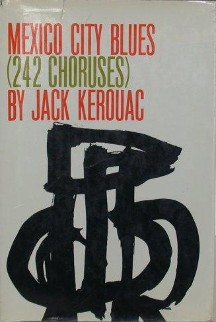Mexico City Blues

First edition
|
|
| Author | Jack Kerouac |
|---|---|
| Cover artist | Roy Kuhlman |
| Country | United States |
| Language | English |
| Publisher | Grove Press |
|
Publication date
|
1959 |
| Media type | Print (hardback and paperback) |
| OCLC | 20993609 |
| Preceded by | Maggie Cassidy (1959) |
| Followed by | Book of Dreams (1960) |
Mexico City Blues is a poem published by Jack Kerouac in 1959 composed of 242 "choruses" or stanzas. Written between 1954 and 1957, the poem the product of Kerouac's spontaneous prose, his Buddhism, and his disappointment at his failure to publish a novel between 1950's The Town and the City and 1957's On the Road.
Kerouac began writing the choruses that became Mexico City Blues while living with Bill Garver, a heroin addict and friend of William S. Burroughs, in Mexico City in 1955. Written under the influence of marijuana and morphine, choruses were defined only by the size of Kerouac's notebook page. Three of the choruses (52, 53 and 54) are transcriptions of Garver's speech, while others sought to transcribe sounds, and others Kerouac's own thoughts. The choruses include references to real figures including Burroughs and Gregory Corso, as well as religious figures and themes. After finishing Mexico City Blues, while still in Mexico City, Kerouac wrote Tristessa.
In October 1957, after Kerouac achieved fame with On the Road, he sent Mexico City Blues to City Lights Books in the hopes of publication in their Pocket Poets series. In 1958, after the publication of The Dharma Bums, Kerouac's friend Allen Ginsberg tried to sell the book to Grove Press and New Directions Press. It was eventually published by Grove in November 1959.
Upon publication a review by the poet Kenneth Rexroth appeared in The New York Times. Rexroth criticized Kerouac's perceived misunderstanding of Buddhism ("Kerouac's Buddha is a dime-store incense burner") and concluded "I've always wondered what ever happened to those wax work figures in the old rubber-neck dives in Chinatown. Now we know; one of them at least writes books." Ginsberg, in observations recorded in Barry Gifford and Lawrence Lee's oral history Jack's Book (1978), attributed Rexroth's "damning, terrible" review and his condemnation of the Beat phenomenon to Rexroth feeling vulnerable as a result of the perception that "he had now 'shown his true colors' by backing a group of unholy, barbarian, no-account, no-good people – Beatnik, unwashed, dirty, badmen of letters who didn't have anything on the ball. So he may have felt vulnerable that he originally had been so friendly, literarily, and had backed us up."
...
Wikipedia
